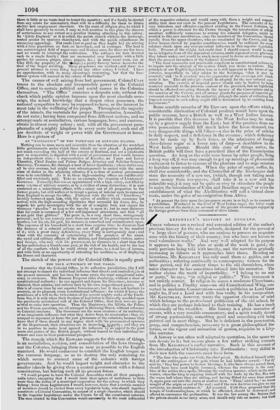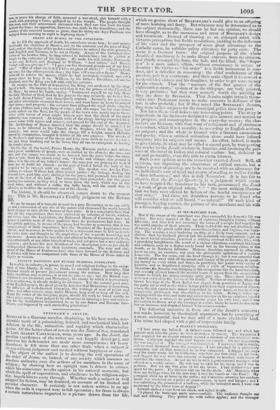liZEIGHTLEY ' S HISTORY OF ENGLAND.
_NESE volumes are a revised and extended edition of the author's previous history for the use of schools, designed for the perusal of " a large class of' persons, who are anxious to possess an acquaint- ance with the history of' their country, but who have not leisure to read voluminous works." And very well adapted for its purpose it appears to be. The plan or scale of the work is good ; the early portions being told with brevity, and the narration gradually increasing in fulness as it approaches later themes. Reading our historians, Mr. KEIGHTLEY IRIS Only used them as guides, not as authorities ; referring continually to contemporary writers for the later period, and for ancient times to the old chroniclers, whose naive character he has sometimes infused into his narrative. The author claims the merit of impartiality. " I belong to no sect or party," he says, " in religion or polities." This statement is not strictly correct. In religion he seems a moderate Churchman; and in politics a Finality man—an old Constitutional Whig, con- verted to moderate Conservatism—such a politician as Lord Grim might be, if not a Lord and with less vanity in his composition. Mr. KEIGTDLEY, however, wants the apparent elevation of' mind which belongs to the professional politicians of the old school, for which they are perhaps indebted to their training. He has a touch occasionally of the twaddler. His history is a plain narrative of events, with a very sensible commentary, and a spirit totally devoid of strong partisanship, something good and something evil being pointed out in most things. But he is deficient in the penetration, grasp, and compreheusion, necessary to it great philosophical his- , torian, or the vigour and animation of genius, requisite to a Livy- like narrator.
A history is not often well adapted to quotation, in the space we can devote to it ; but we can glean a few rather striking extracts from Mr. KinonTLEy's earlier narrative. Such is this account of the introduction of' Christianity into Northumbria : very skilful in their new faith the converts inust have been.
" The first who spoke was Coiii, time chief priest. He declared himself satis- fied of the nothingness of the gels whom he hail hitherto served.: For said he, 4 they hail power to bestow blessings, I, who have always served them, should have lieen most highly fivoured, whereas the contrary is the case.' One of the nobles filet' spoke, likening the soul to a sparrow, which in the mid- winter, when the king is enjoying himself with his lords by the fire, flies into the warm hall where they are sitting, and having flitted for some time around it, again ,imes out into the storm at another door. ' Thus,' added he, 6 we know nought of the origin or end of the soul ; and it' the new doctrine can give us any certainty, we should embrace it.' All assented. Coils then proposed that the temple of Godinundinghans, at which he officiated, shoulul be destroyed; and offered to commence the profiination. It was the law among the Saxons that the priests should never carry armies, and should only ride on mares; bat Cod pow, to prove his change of faith, mounted a war-steed, girt himself with a amid, and, grasping a lance, galloped on to the temple. The people thought Itlin mad and their amazement increased when they saw him hurl his lance asainst the fane: no opposition, however, waa made to the demolition; and the liamber of the converts became so great, that for thirty-eix days PauHaus was eugaged from morning to night in baptizing them."
DEATH AND BURIAL OF THE CONQUEROR.
As he felt the approach of death, his conscience smote him ; he sent money to rebuild the churches at Mantes, and to the convents and the poor of Eng- land; and at the desire of Ida prelates and barons he ordered the state prisoners,
both English and Norman, to be set at liberty. Aware of the turbolent cha- racter of his brother Odo, he long refused to include him ; but he yielded at kugth to the entreaties of his friends. He made his will, leaving Normandy
to his son Robert, and England to William. " And lather," sail Henry, I' what will you give me ? " "I give you five thousand pounds out of my trea- sure." " But of what use is it if I have no place of abode ? " " Trust in God, SOn ; let thy elders precede thee ; thy time %fill come after theirs." Henry w;mt off to receive the money, which he had accurately treighed, and got a strong chest to keep it in. William, by his father's directions, set out for England, and the King was left with only his servants.
At atomise on the filth of September, the King was awakened by the ring-
ing Ifs bell. On inquiry he Wa3 told that it was for primes at the Church of
St. Mary : he raised his hands, saving, " I commend myself to my lady Mary the holy Mother of God, that by her prayers she may reconcile me to her Son, Inc Lord. Jesus Christ," and immeffiats:ly expired. Instantly his phyaiciaus atid other attendants mounted their horses, and went home in haste to protect their houses and property : the servants then pillaged the royal abode, carrying off arms, clothes, and every thing of value ; and the corpse lay for some hours nearly naked on the floor, for the people of the town were nearly beside them- selves with terror of what might happen now that the check of the royal authority was removed. At length some of the clergy having recovered their senses, came with tapers and censers, and prayed for the soul of the departed. The Archbishop of Rouen directed that the corpse should be conveyed to Caen, to be interred in the Church of St. Stephen, which the King had tended; but none would take the charge, till a knight, named Iferluin, moved by compassion, brought it thither at his own expense. The monks of St. Stephen's and many of the clergy and laity came forth to receive it ; but a fire just then breaking out in the town, they all ran to extinguish it, leaving the monks alone.
On the day of the burial, Prince Henry, the Norman prelates and abbots, and a great multitude of people, were assembled in the church; the mass was said, and the corpse was about to be lowered into the grave before the altar, when a voice front the crowd cried out, " Clerks and bishops, this ground is tine; it is the site of my father's house : the loan you are proving for took it from use to build his church : out the part of God, I forbid the boilv of the f:espoiler to be covered with my mould." The speaker was Assellit Fitz- Arthur, to whom 1Villiam had often denied justice : the bishops, finding his &mad just, paid him sixty shillings for the grave, and promised him the full value of the rest of the land. The ceremony then proceeded ; but the grave proving too narrow, as they tried to force down the body, which was in the loyal robes, and without a coffin, the belly burst, and the smell was so offensive as to drive the assistants out of the church.
The history, it should be observed, comes down to the present day. This is Mr. KEIGHTLEY'S Finality judgment on the Reform We are by means of it brought as near to a pure Democracy as we can safely ca, and a concession of any one of the points still clamoured for wool(' beyotid
'doubt plunge us into all the horrors of that state. It is a remarkable fact, that after all the expectations that were excited of an infusion of talent, wisdom, and, virtue ii,to the Legislature, the Reformed House of Commons does not
passes, a particle more of these qualities than its predecessors bad done. In fact, public opinion, by means of the press, had become so powerful, that it was comparatively of little importance how the Members of the Legislature were chosen; mid moreover, he who aspires to be a statesman must be able to devote his entire time and thought to the acquisitioa of the requisite knowledge and experience. Amon may be very able and efficient in the management of a bank, or a cotton-mill, or any other branch of trade, rind vet prove but a very ordinary legislator; and hence the new Members of this description have as yet chietl3- distinguished themselves by their legislative crotchets. The tone and dia. taller of the House of Commons have also been lowered by the Reform and its debates will bear no comparison with those of the House of Peers either in dignity or wisdom.
PRESENT HAPPINESS AND FUTURE FEARS—A PERORATION.
lit wealth, in industry, in power, in moral and religious feeling, in the enjoy- ment of true liberty, it may, we think, be asserted without partiality, that England stands at present prel:minent among the nations. How long that happy condition may continue, it is not fm man to say ; but the British con- stitution is not immortal, and Democracy, the enemy by which it is eventually to be overthrown, is already making its advances. Yet the natural good sense of the English people, the proof given by America that Democracy is ilespotism, the influence of well-directed education, the writings of men of talent and virtue, and other causes, may, under Heaven, long avail to keep off the evil. Happy the writer of the foregoing pages, should his work be found worthy to take a place among those judged to he efficacious in infusing a love and venera- lieu for the institutions transmitted to us by our Saxou and Norman fore- fathers, and improved by each succeeding generation



























 Previous page
Previous page